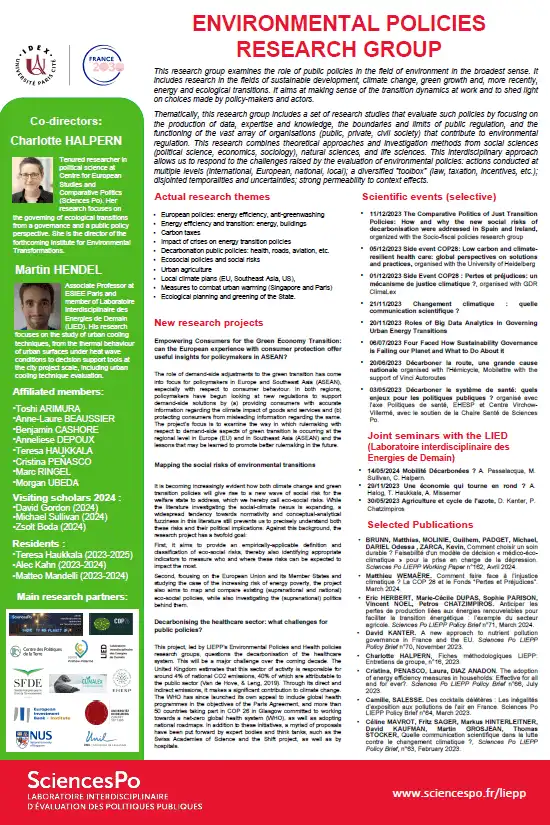
Home>Research>Research Groups>Environmental Policies
Research Group: Environmental Policies
Research group directors: Charlotte HALPERN, Martin HENDEL
Involved members:
Anne-Laure BEAUSSIER, Anneliese DEPOUX, Paolo GRAZIANO, Teresa HAUKKALA, Eloi LAURENT, Héloïse NEZ, Cristina PEÑASCO, Stefan POLLINGER, Marc RINGEL, Yamina SAHEB, Matthieu SARNIN, Nicolas SENN, Michael SULLIVAN, Sarah THOMPSON, Morgan UBEDA, Mallory ZHAN,
Presentation of the Environmental Policies Research Group

The 'Environmental Policies' research group aims to make sense of environmental policies in the broadest sense - sustainable development, climate change, green growth and, more recently, energy and ecological transitions - and to shed light on the choices made by policy-makers and, more generally, a wide range of stakeholders.
This line of research seeks to assess evaluates these public policies by focusing on the production of data, expertise and knowledge, the boundaries and limits of public regulation, and the functioning of the vast array of organisations (public, private, civil society) that contribute to environmental regulation. This research combines theoretical approaches and investigation methods from the social sciences (political science, economics, sociology), natural sciences and life sciences. This interdisciplinary approach allows us to respond to the challenges raised by the evaluation of environmental policies: actions conducted at multiple levels (international, European, national, local); a diversified "toolbox" (law, taxation, incentives, etc.); disjointed temporalities and uncertainties; strong permeability to context effects.
This research is guided by several principles:
- a processual approach to identify the actors and mechanisms at work from policy formulation to policy implementation;
- a cross-sectoral comparative perspective to address: first, the dynamics at play within issue-specific environmental policies (biodiversity, etc.) and resulting from the mainstreaming of environmental protection objectives throughout sectoral policies (agriculture, transport, energy, etc.); second, the comparison between political and institutional contexts to assess policy capacities throughout the policy process and across different levels of governance;
- public policies analysed from the point of view of both their substance and their instrumentation in order to assess the specific role of monitoring and evaluation devices.
This research group develops its activities in partnership with the Earth Politics Center's research program.
For more information, read the interview with Charlotte Halpern.
Seminars of the research group
The Environnmental Policies research group organizes seminars open to all, presenting research work on various topics related to its research themes.
Find out more about the Environmental Policies Seminars.
LIEPP / LIED joint seminars
LIED (the Interdisciplinary Energy Research Institute) and LIEPP's Environmental Policies research group organize joint seminars on themes of shared interest. Find out more about the LIEPP/LIED joint seminars.
Associated Research Projects
Ongoing projects
- Eliciting the Social Cost of Carbon (2025)
- Deprecription and perceptions – a mixed approach to understanding barriers and drivers (DEPREFLEX) (2025)
- Post-growth health and healthcare: redefining health and health policies for the 21st century (2025)
- Energy justice, public action and collective mobilisation: a European comparison (JUSTENERGY) (2025)
- JETCities: Boosting Green Workforce in Cities (2025)
- Towards a welfare state at +4 degrees? Rethinking social protection in the light of environmental disasters (2024)
- Empowering consumers for the ecological transition in ASEAN and Europe (2024)
- Decarbonising the healthcare sector: what challenges for public policies? (2023)
- Policies for Sustainable Consumption and Sufficiency: Justice, Effectiveness and Instrumentation (2024)
- Mapping the social risks of environmental transitions (2023)
- Policy Instruments for the energy efficiency sector: enabling mechanisms for a "FIT for 55" efficient transition (PIREES55) (2023)
- Climate action plans inventories : policy instruments to reduce GHG emissions at the city level (CAPin GHG) (2021)
- Les politiques publiques et la gouvernance des transitions écologiques (2020)
- Comprendre le rôle des collectifs et leurs relations avec les politiques publiques de réduction des inégalités socio-environnementales (CIVIC ACT 2) (2020)
Interviews, notes and analysis
- Une expérience Fulbright à Sciences Po pour étudier l'écologie et l'agriculture urbaine (interview with Alec Khan, november 2024)
- Comment faire face à l’injustice climatique ? La COP 28 et le fonds « pertes et préjudices » (interview with Matthieu Wemaëre, march 2024)
- Penser une transition socio-écologique juste (interview with Nathalie Blanc, november 2023)
- Evaluation de l'impact thermique des cours d'école OASIS (interview with Martin Hendel, December 2022)
- LIEPP internship on interdisciplinary environmental research (interview with Sophia Noel, may 2022)
Publications of the research group
- Déprescrire dans une perspective santé - environnement : quelles pistes pour les politiques publiques en France ?, report on the seminar co-orginazed by LIEPP's Health policies and Environmental policies resreach groups, December 4th 2024
- HAUKKALA, Teresa. The EU Circular Economy Action Plan: Key Assumptions and Strategic Risks. LIEPP Policy Brief n°79, May 2025.
- MANDELLI, Matteo, LEE, Jaewook, Mapping energy poverty policies across the EU: pathways towards eco-social integration? Sciences Po LIEPP Working Paper n°176, Février 2025
- ROCHARD, Hugo. Planter des arbres en ville : au-delà de la solution, penser la gouvernance. Sciences Po LIEPP Policy Brief n°77, November 2024
- MANDELLI, Matteo, BEAUSSIER, Anne-Laure, CHEVALIER, Tom, PALIER, Bruno. Defining, Operationalizing and Classifying Socio-Ecological Risks. Sciences Po LIEPP Working Paper n°170, Novembre 2024
- GINSBURGER, Maël. Les marges de manœuvre des ménages dans la transition écologique : entre empreinte carbone et contraintes sur la décarbonation. Sciences Po LIEPP Policy Brief n°76, November 2024
- ARTIGAS, Alvaro, HALPERN, Charlotte, et al. Urban Heat and critical environmental thresholds: new bridges between science and policy?. Sciences Po LIEPP Policy Brief n° 74, September 2024
- BEAUSSIER, Anne-Laure, CHEVALIER, Tom, PALIER, Bruno. Qui supporte les coûts des transitions environnementales ? Penser les inégalités face aux risques sociaux liés au changement climatique. Sciences Po LIEPP Policy Brief n°73, September 2024.
- SULLIVAN, Michael. Reconsidering Discretionary Travel. Sciences Po LIEPP Working Paper n°168, September 2024
- Anthony HALOG, Lauren MCGAVIN . Policy design for solar waste management in a decarbonised, circular economy: a systematic review. Scienes Po LIEPP Working Paper n°166, 2024
- Eric HERBERT, Marie-Cécile DUPAS, Sophie PARISON, Vincent NOEL, Petros CHATZIMPIROS, Anticiper les pertes de production liées aux énergies renouvelables pour faciliter la transition énergétique : l’exemple du secteur agricole. Sciences Po LIEPP Policy Brief n°71, 2024
- David KANTER, A new approach to nutrient pollution governance in France and the EU. Sciences Po LIEPP Policy Brief n°70, 2023
- Céline MAVROT, Fritz SAGER, Markus HINTERLEITNER, David KAUFMANN, Martin GROSJEAN, Thomas STOCKER, Quelle communication scientifique dans la lutte contre le changement climatique ?. Sciences Po LIEPP Policy Brief n°63, février 2023
- Cristina PEÑASCO, Laura DIAZ ANADON The adoption of energy efficiency measures in households: Effective for all and for ever? , Sciences Po LIEPP Policy Brief n°66, 2023
- Camille SALESSE, Des cocktails délétères : Les inégalités d’exposition aux pollutions de l’air en France , Sciences Po LIEPP Policy Brief n°64, 2023
- Charlotte HALPERN, Parnika RAY Road Space Reallocation for Sustainable Urban Mobility in the EU: The balancing act between EU regulations and cities as urban space managers. Sciences Po LIEPP Policy Brief n°60 2022
- Carola KLOECK, Paula CASTRO, Florian WEILER, Coalitions in the Climate Change Negotiations. Sciences Po LIEPP Policy Brief n°55, octobre 2021
- Jean-Noël JOUZEL , L'évaluation des risques des pesticides : entre science et fiction d'action publique. Sciences Po LIEPP Policy Brief n°48, Octobre 2020


